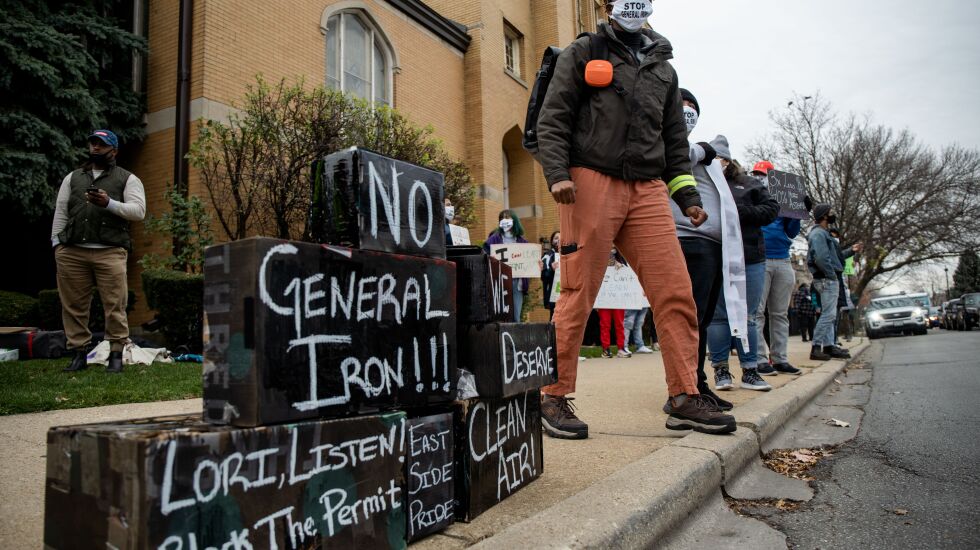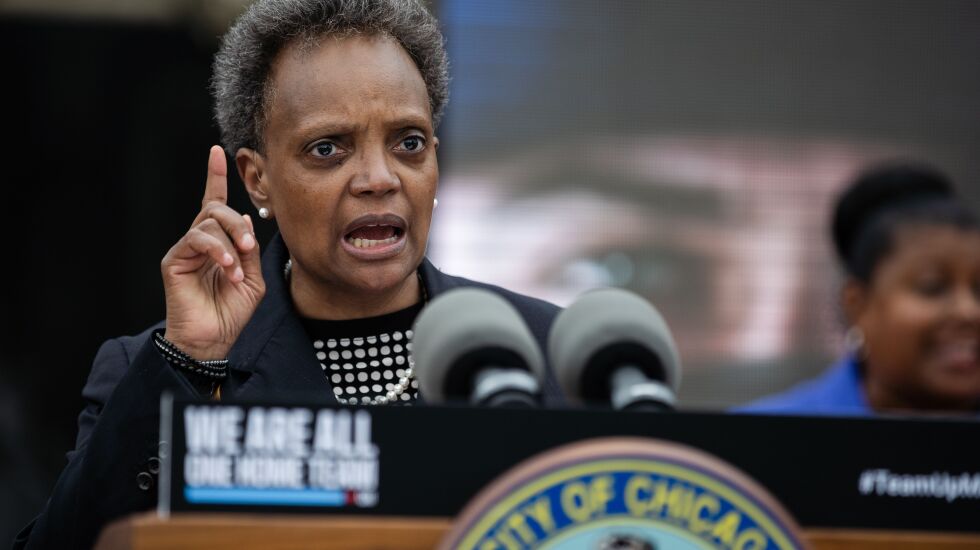
The city of Chicago is violating the civil rights of its residents by relocating polluting businesses from white communities into Black and Latino areas that already are overwhelmed with environmental and health issues, federal officials have found after a nearly two-year investigation.
The U.S. Department of Housing and Urban Development is demanding that Chicago change its unlawful planning, zoning and land-use policies so they don’t discriminate against communities of color, according to a letter HUD sent to the city.
If Mayor Lori Lightfoot’s administration doesn’t agree to work on a plan to overhaul its processes and policies, City Hall could lose hundreds of millions in federal housing money.
In 2021, HUD says City Hall distributed $375 million in grants and other funding from the agency among 13 departments.
The investigation was sparked by a complaint from community organizers who challenged the city’s role in the planned relocation of the General Iron metal-shredding business from mostly white Lincoln Park to a majority-Latino Southeast Side community surrounded by Black neighborhoods.
“These actions continued a broader policy of shifting polluting activities from white neighborhoods to Black and Hispanic neighborhoods despite the latter already experiencing a disproportionate burden of environmental harms,” according to the HUD letter, obtained by the Chicago Sun-Times.
In response, Lightfoot spokesman Cesar Rodriguez said: “Any allegations that we have done something to compromise the health and safety of our Black and Brown communities are absolutely absurd. We will demonstrate that and prove [HUD] wrong.”

In February, Lightfoot rejected a permit that would allow the Southeast Side metal operation to open.
But HUD investigators looked more broadly at city officials’ actions prior to that decision, including an agreement that City Hall signed with the business’ owner months after Lightfoot took office in 2019.
General Iron operated in Lincoln Park for decades, shredding cars, large appliances and other types of scrap metal for recycling on 20 acres along the North Branch of the Chicago River.
For years, neighbors complained about the smell, noise and other nuisances there.
City emails show that, under Mayor Rahm Emanuel, city officials pushed for the business to move to make way for a new use, which was part of bigger plan for the multibillion-dollar Lincoln Yards private real estate development that’s now in the works.
In September 2019, Lightfoot’s top lawyer signed an agreement with Reserve Management Group, a company that agreed to buy and relocate General Iron to the Southeast Side. The document laid out a plan for the business to shut down in Lincoln Park at the end of 2020. The company would get city permits to open at East 116th Street along the Calumet River if city conditions were met, the agreement said. Reserve Management was so confident it would win approval that it built a new operation along the Calumet River.
“The events surrounding the public announcement and the agreement reveal an unusually close collaboration between the city and the companies,” HUD said in its letter. “Absent the city’s driving role, the relocation would not have occurred.”
The city didn’t listen to residents on the heavily industrial Southeast Side who argued that they couldn’t welcome another polluting industrial operation, HUD said.
“The city ignored key substantive concerns throughout the process,” the letter said. “Disparities in environmental burdens and their health effects were well known by the city and raised by residents and experts, yet the city took significant actions towards the relocation without considering how the relocation would exacerbate those disparities.”
Despite neighbors’ complaints prior to the Lincoln Park site’s closing in 2020, Emanuel’s and Lightfoot’s administrations both dismissed concerns from Southeast Side residents, according to HUD.
“The city’s disregard for the Southeast [Side] residents’ concerns stands in contrast to the city’s receptiveness to the complaints of the Lincoln Park residents that the relocation aimed to address,” the HUD letter said.
“It was offensive to us,” said Peggy Salazar, a now-retired community activist who was among those filing a complaint in the case.
The federal agency pointed to other related planning actions, including the city’s review of industrial corridors and a refocused purpose for the North Branch industrial corridor where General Iron previously operated. A reimagined Ravenswood industrial corridor on the North Side also was completed under Emanuel.
“The city strongly influences where heavy industry is sited,” HUD said. “The city has largely chosen to use this influence to redevelop formerly industrial areas in white neighborhoods.”
HUD investigated the civil rights matter after a complaint from several South Side groups, including the Southeast Environmental Task Force and People for Community Recovery.
“It’s an incredible tribute to the community groups that they were willing to think about this case not just addressing a local situation but also a way to take on City Hall and take on systemic issues around land use,” said Keith Harley, a lawyer with the Greater Chicago Legal Clinic, who filed the complaint with HUD.

HUD said the city is violating Title VI of the federal Fair Housing Act.
If Lightfoot’s administration doesn’t agree to a “voluntary compliance agreement” that has a “clear timetable for implementation,” HUD said it can begin a process to force the city to act, which could include referring the matter to the Justice Department.
In 2019, HUD entered into a voluntary agreement with Los Angeles city officials in a case in which the agency said many of the city’s low-income housing units weren’t accessible to disabled people.
Brett Chase’s reporting on the environment and public health is made possible by a grant from The Chicago Community Trust.







